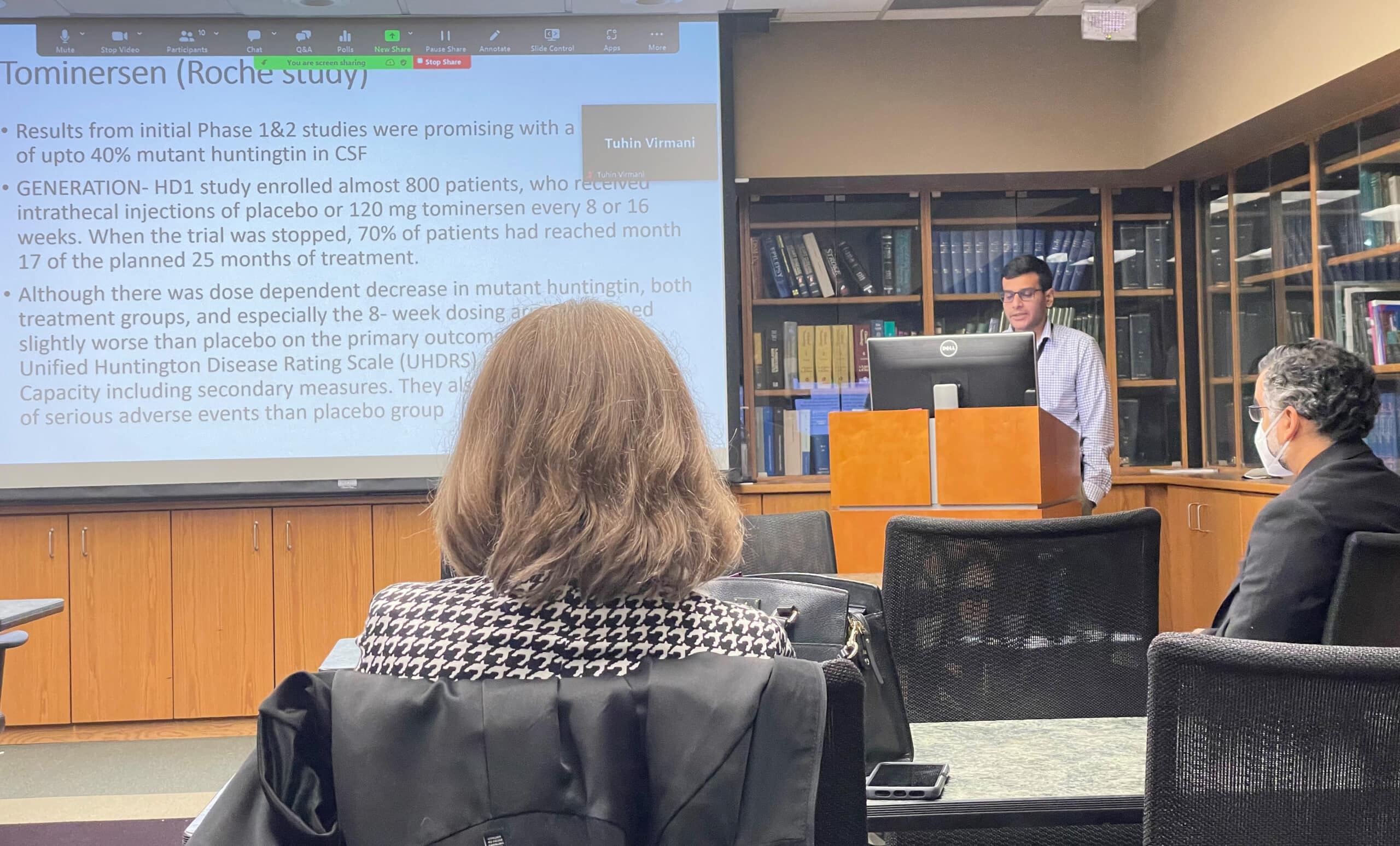Huntington’s Disease Symposium Details Resources, Seeks Study Participants
| Jan. 20, 2023 | Much remains unknown about Huntington’s disease, an inherited brain disorder that tends to surface in a person’s 30s or 40s and causes progressively worsening motor, cognitive and psychiatric symptoms.
That’s why participants are needed for ongoing clinical trials, according to doctors and researchers who spoke during the annual Huntington’s Disease Symposium at the University of Arkansas for Medical Sciences’ (UAMS) Jackson T. Stephens Spine & Neurosciences Institute.
Held Dec. 8 before an in-person and a virtual audience, the symposium also focused on getting the word out about resources available for both patients and their caregivers through the UAMS’ Huntington Disease Clinic.
The clinic, which is part of the UAMS Movement Disorders Clinic, has been designated a Center of Excellence by the Huntington’s Disease Society of America (HDSA), in recognition of its multidisciplinary commitment to patients and families. It is the only HDSA Center of Excellence in Arkansas, where there are an estimated 200 people with the disease.
The services and resources it offers to Huntington’s disease patients and their caregivers are immense.
Hillary Williams, M.D., an assistant professor in the UAMS College of Medicine’s Department of Neurology who specializes in movement disorders, described some of the unique benefits available for patients, family members and caregivers at the multidisciplinary clinic.
For example, she said, Huntington’s disease patients often experience movement difficulties, including extra involuntary movements that affect their balance, coordination, walking and ability to take care of daily activities.
“Having experts who can identify this early and make sure that our patients are on the right treatment path is essential,” she said.
Williams noted that physical therapy and occupational therapy, both of which are also available at UAMS, have been shown to help Huntington’s patients prevent injuries from falls.
Speech-language pathologists, also called speech therapists, help patients with speech problems such as slurred or difficult-to-understand words, as well as language problems such as grammar and comprehension, she said.
“A speech-language pathologist also may be able to identify swallow strategies that are necessary to keep a patient swallowing safely,” Williams said, citing chin tucking while eating as an example.
She said dieticians and nutritionists at UAMS understand that the extra movements a Huntington’s disease patient experiences can change the patient’s metabolic needs as well as the number of calories needed to maintain weight, which is essential to maintaining muscle mass and being able to perform physical therapy and other beneficial measures.
“Having a nutritionist or a dietician on board is a very important part of the multidisciplinary team,” Williams said. Also, “a psychologist or a psychiatrist or a neuro-psychologist may be involved,” since Huntington’s patients can experience things that affect their mental health and their cognition.
“This can include irritability, hyper-fixation where they become fixated on certain subjects, mood lability (rapid, exaggerated changes in mood, sometimes with uncontrollable emotions) and memory problems.
“Now, many times our movement disorders specialists are available to help with some mood disorders, but if a patient is really struggling, getting a psychiatrist can really add to the care,” she said.
She stressed the importance of research.
“Another important thing about Centers of Excellence is that you may have research available,” Williams said. “Being part of a larger group, being part of a research center, is important to progressing the future of the disease.”
Williams also touted the resources available to patients and caregivers through the website hdsa.org, which she called “a wonderfully built website that is meant for patients and families to easily navigate.”
Williams and other speakers encouraged patients and their caregivers to participate in clinical trials that seek to understand more about the disease and find better treatments.
“We love to have patients who help us learn more,” she said.
“Most medical research could not be performed without the service of the patients who have participated in clinical trials,” Williams emphasized. “Clinical trials can be anything from observational, where we learn from you as you battle this disease, or it can be where we use family members or friends who can be controls in our studies or help find interventions that may one day slow or stop the disease process.”
Aditya Vikram Boddu, M.D., an assistant professor of neurology who recently joined UAMS from the University of Alabama where he completed a movement disorders fellowship, shared updates into research on Huntington’s disease, which he defined as a genetic disease in which a single genetic mutation is responsible for all cases.
He said research is indicating that combination approaches will be needed to more adequately treat Huntington’s disease.
“We’re slowly inching toward a cure,” Boddu said. “Sometimes it’s two steps forward and one step back, and that seems to be the theme.”
He also briefly discussed some of the research being done at UAMS.
Tuhin Virmani, M.D., Ph.D., who co-directs the UAMS Huntington’s Disease Clinic with Rohit Dhall, M.D., noted that a trial is being planned, taking lessons from a failed trial that stopped in early 2021, to re-test a drug that could slow progression of the disease.
“Hopefully, down the road we will learn more about when that study will become active,” Virmani said.
Anyone interested in participating in or learning more about current clinical trials related to Huntington’s disease can email TRICoordinators@uams.edu or AVBoddu@uams.edu.
